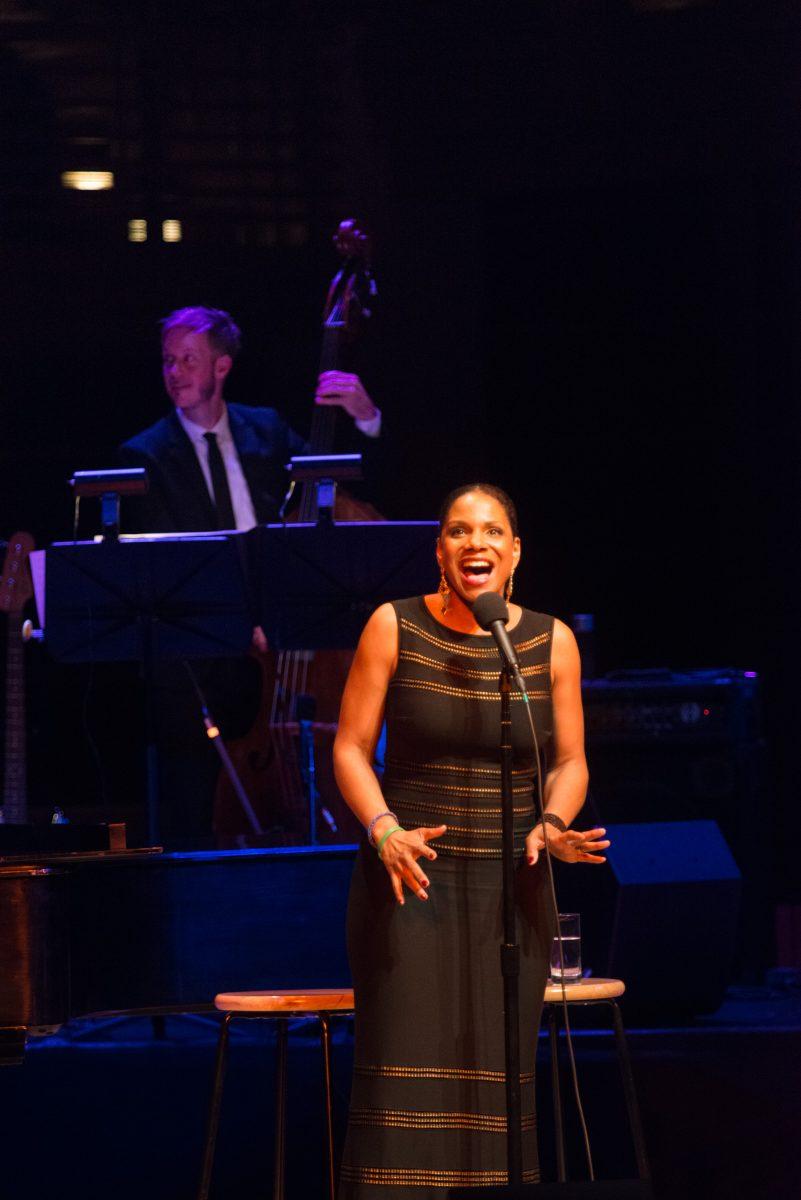From an opening rubato to the evening’s final crescendo, Tony and Grammy award winner Audra McDonald and her trio provided a capacity crowd with nearly two hours of show tunes, heart-warming stories and personal engagement.
The concert was preceded by an LGBT social event in the lobby called “A Night OUT at Weill Hall” featuring fine wine, food, activities and an appearance by McDonald. The pairing of the two events was apropos since McDonald is a well-known supporter of gay rights.
Three veteran musicians accompanied McDonald. Andy Einhorn (music director, piano, backup vocals) was the conductor and musical director of Rodgers & Hammerstein’s “Cinderella” (2013), “Evita” (2012) and “Sondheim on Sondheim” (2010).
Mark Vanderpoel (acoustic and electric bass, backup vocals) also performed in “Cinderella” as well as “Legally Blonde” (2007) and “Jane Eyre” (2000).
The résumé of Gene Lewin (drums, percussion, backup vocals) states, “his eclectic discography ranges from the modern jazz of Fundementia (a group he co-leads) to the electric-violin pop of GrooveLily.”
Performing Show tunes is a difficult assignment for musicians of any caliber since counting off songs and vocal cues are prohibited. Consequently, “pit” musicians rely on head gestures from music directors, scores and refined listening skills.
This trio made it look all too easy as it followed McDonald through a journey of monologues, rubatos, starts and stops, tempo passages, and time signature and key changes.
McDonald, a 1993 graduate of the Juilliard School, is a commanding presence on stage, and appears to be extremely comfortable while singing or introducing songs via poignant or humorous personal accounts.
For her fourth selection, she introduced “I Double Dare You,” a swing tune from the 1930s and part of the score from Woody Allen’s “Radio Days” (1987), with an account about meeting a 90-year-old man outside a Chipotle Mexican Grill in Cambridge, Mass., who sang the song with perfect pitch in a key unattainable for most men.
McDonald sings the song in that exact key to honor the man, and playfully suggested that the audience “look him up” the next time they are in Cambridge.
Later, she introduced “I Could Have Danced All Night” from “My Fair Lady” (1956) by saying she “likes songs off the beaten path … except this one.” The foursome wove an unusual arrangement of style and tempo that culminated in audience participation.
The crowd sang with near-perfect pitch through a chorus or two and upon completion, McDonald addressed a young woman in the balcony: “Are you a soprano?” The woman responded by saying she was an alto.
McDonald chuckled — apparently at the thought of an alto reaching the soprano register — and told her “you have a very beautiful voice.” That type of confidence and sincerity is rare among those with McDonald’s stardom.
Six tunes later, McDonald sang “Climb Ev’ry Mountain” from “The Sound of Music” (1965) with power and grace. The performance was a strong testament to her magnificent gift, and if the partial standing ovation was any indication, the Sonoma County audience thoroughly enjoyed her signature piece.
After a moving performance of “Go Back Home,” the title track from her 2013 album and a song from “The Scottsboro Boys” (2010), McDonald mentioned that the song’s lyricist, Fred Ebb (1928 – 2004), wrote a scholarship into his will and testament called “The Fred Ebb Award for Musical Theater Songwriting.”
She introduced the next song as one written by Adam Gwon, the 2008 winner of the award, before delving into an anecdote about a Manhattan couple whose relationship ceased after one of them perished in the World Trade Center collapse.
Perhaps the residual effect of back-to-back emotional songs took its toll, or perhaps it was her connection to New York City, but her glassy eyes were clearly evident from the center of the orchestra section.
McDonald worked her way through two more tunes before encoring with “Somewhere Over the Rainbow” from “The Wizard of Oz.” During its introduction, she said her support of “marriage equality” was connected to her appreciation of the Civil Rights movement and how it positively impacted her life as a black American.
After observing McDonald in concert, one gets the impression that everything in her show, from selecting fellow musicians and songs, to introducing them with interesting anecdotes, is all done with precision. Her body of work and recognition speak volumes about her talent, but her ability to freely disclose elements of her personal life and experiences is refreshing, and adds a degree of separation between her and her contemporaries.



































